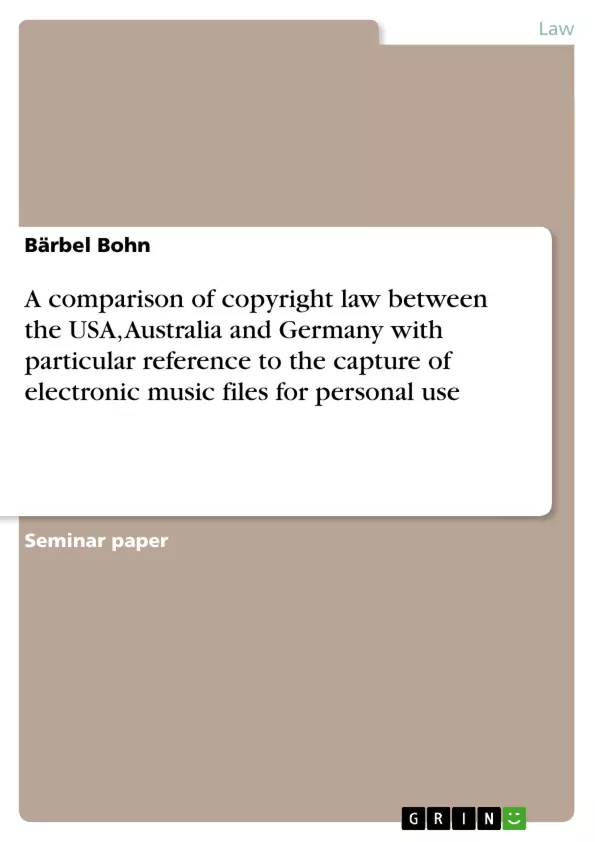Copyright is the term for a bundle of exclusive rights given by law to the owner of the copyright. Basically the copyright Law is supposed to maintain a fair balance between providing users with reasonable access to the growing information economy on the one hand, and providing recognition and rewards for creators on the other.
With the technological progress the importance of copyright Law increased. It became very easy and popular to infringe copyright by using the new technological inventions – such as CD-burner etc and Internet. The protection of copyright is nowadays not just a national issue anymore as the world becomes more addicted to the internet every day.
Infringement of copyright in sound recordings is one of the most common infringements.
Nowadays you can see the term “mp3” everywhere. DVD-players can play mp3s, there is special software for your computer to play mp3s, there are special players like ipods or even smaller players which are just the size of a lighter and even your mobile phone can play mp3s now. But what is exactly is mp3? This paper compares copyright law between the USA, Australia and Germany with particular reference to the capture of electronic music files for personal use. There are many ways of capturing mp3s – such as downloading them from the internet, using filesharing software e.g. kazaa or converting music files from a CD into mp3s.
Inhaltsverzeichnis (Table of Contents)
- A) Introduction
- B) What is mp3
- C) "Ripping" a CD
- 1) International level
- I) Background
- II) European Union & Germany
- a) Content of the new provisions
- b) Anti-Circumvention and Anti-Trafficking Provisions.
- c) Criminal and Civil Liability for Violating § 95a UrhG.
- d) Limitations and exceptions
- 3) USA
- I) Generally.
- II) Fair use doctrine
- III) Anti-Circumvention and Anti-trafficking Provisions
- 4) Australia..
- I) Generally.
- II) Fair Dealing.
- III) Circumvention of technological measures.
- D) Conclusion..
Zielsetzung und Themenschwerpunkte (Objectives and Key Themes)
This paper aims to analyze and compare copyright law provisions in the USA, Australia, and Germany, specifically focusing on the legality of capturing electronic music files for personal use. It examines the interplay between copyright protection, technological advancements, and user rights in a globalized digital environment.
- Copyright protection in the digital age
- Legal implications of "ripping" music files from CDs
- International copyright conventions and their impact on national laws
- The role of technological measures in preventing copyright infringement
- Balancing user rights with the interests of copyright holders
Zusammenfassung der Kapitel (Chapter Summaries)
- A) Introduction: This section provides an overview of copyright law and its importance in the digital age, highlighting the challenges posed by new technologies like CD-burners and the internet. It emphasizes the significance of copyright protection in balancing user access to information with the recognition and rewards for creators.
- B) What is mp3: This section explains the technical aspects of mp3 file format, including its compression methods and how it reduces the original sound data without compromising sound quality.
- C) "Ripping" a CD: This section delves into the common practice of converting music files from CDs to mp3s. It discusses the process of "ripping" and the legal considerations involved, particularly in relation to the international framework of copyright law.
- 1) International level: This section focuses on the international efforts to harmonize intellectual property law. It provides a background on WIPO (World Intellectual Property Organization) and its role in protecting intellectual property rights globally. It discusses the significance of the WIPO Copyright Treaty (WCT) and its implications for digital rights management.
- II) European Union & Germany: This section examines the copyright law provisions in the European Union, with a particular focus on Germany. It analyzes the new provisions related to technological measures, anti-circumvention, and anti-trafficking provisions. It also explores the criminal and civil liabilities associated with violating these provisions.
- 3) USA: This section analyzes the copyright law in the USA, examining the "fair use" doctrine and its application to "ripping" music files. It further examines the anti-circumvention and anti-trafficking provisions in the US copyright law.
- 4) Australia: This section explores the copyright law in Australia, focusing on the "fair dealing" provisions and the legal implications of circumventing technological measures.
Schlüsselwörter (Keywords)
Copyright law, digital rights management, technological measures, anti-circumvention, anti-trafficking, "ripping" music files, mp3, fair use, fair dealing, WIPO, WCT, Berne Convention, European Union, Germany, USA, Australia, intellectual property rights, user rights, copyright infringement.
- 1) International level
- Arbeit zitieren
- Bärbel Bohn (Autor:in), 2005, A comparison of copyright law between the USA, Australia and Germany with particular reference to the capture of electronic music files for personal use, München, GRIN Verlag, https://www.grin.com/document/41305



